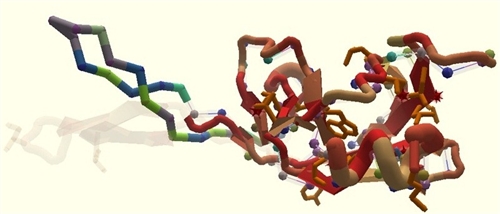Gamers Succeed Where Computers Fail, Fold Enzymes Like a Boss
Research published online in the journal Nature has a somewhat surprising source: PC gamers. Using a program called Foldit, players created an accurate model of a particularly tricky enzyme that has had scientists stumped for some time. Most importantly, the enzyme in question comes from an AIDS-like virus that affects Rhesus monkeys and could possibly open the door for treatments to that horrific disease.
In Foldit, players are presented with a series of brightly colored pieces that represent individual molecules. The rules of chemistry are built into the game, setting the stage for players to strut their stuff folding the molecules into the lowest energy configuration. As the energy gets lower, the score rises, and so go the mechanics of the game. Understanding the folded shape is vitally important for researchers, especially when creating drugs to stop dangerous diseases. In this case, the enzyme in question belonged to a group of enzymes called proteases that help the virus spread.
While distributed computing projects like Folding@Home and SETI@Home have received much attention, Foldit has been plugging along with successes to its credit for years. Interestingly, the complex enzyme problem solved by Foldit players had already passed through a distributed computing effort with no solution in sight. University of Washington biochemist Firas Khatib told MSNBC that putting the monkey virus up on Foldit was a “last-ditch effort.” Though apparently an act of desperation, it certainly paid off as Foldit players found a solution in just under 10 days.
With the monkey virus folded, scientists are now looking at Foldit with new interest, especially given the complexity involved, and the similar structure of this enzyme and those found in HIV. While the scientists continue to work on where to go from here, Foldit players and teams may have a lot more puzzles to work on.
Interestingly, the team that successfully folded the monkey-virus enzyme — called the Foldit Contenders Group — opted not to be listed individually on the research. Instead, the paper carries the name of their team into the annals of medical history.
(via MSNBC, image via University of Washington)
Have a tip we should know? [email protected]
